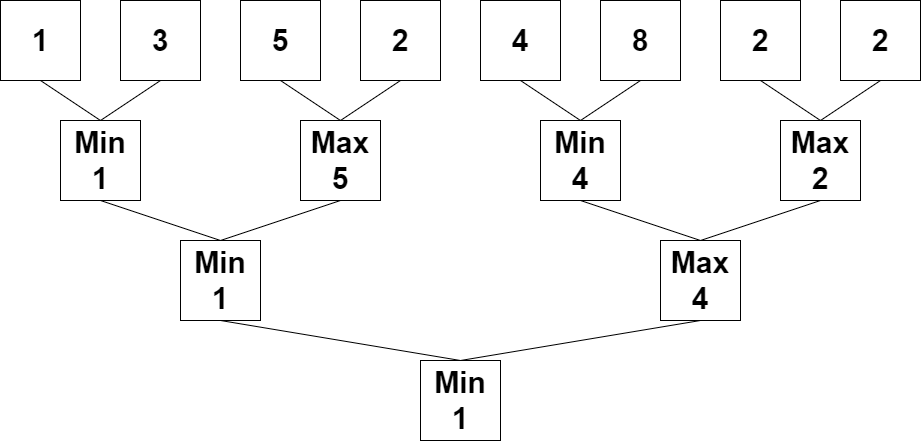| comments | difficulty | edit_url | rating | source | tags | ||
|---|---|---|---|---|---|---|---|
true |
Easy |
1241 |
Weekly Contest 296 Q1 |
|
You are given a 0-indexed integer array nums whose length is a power of 2.
Apply the following algorithm on nums:
- Let
nbe the length ofnums. Ifn == 1, end the process. Otherwise, create a new 0-indexed integer arraynewNumsof lengthn / 2. - For every even index
iwhere0 <= i < n / 2, assign the value ofnewNums[i]asmin(nums[2 * i], nums[2 * i + 1]). - For every odd index
iwhere0 <= i < n / 2, assign the value ofnewNums[i]asmax(nums[2 * i], nums[2 * i + 1]). - Replace the array
numswithnewNums. - Repeat the entire process starting from step 1.
Return the last number that remains in nums after applying the algorithm.
Example 1:
Input: nums = [1,3,5,2,4,8,2,2] Output: 1 Explanation: The following arrays are the results of applying the algorithm repeatedly. First: nums = [1,5,4,2] Second: nums = [1,4] Third: nums = [1] 1 is the last remaining number, so we return 1.
Example 2:
Input: nums = [3] Output: 3 Explanation: 3 is already the last remaining number, so we return 3.
Constraints:
1 <= nums.length <= 10241 <= nums[i] <= 109nums.lengthis a power of2.
According to the problem statement, we can simulate the entire process, and the remaining number will be the answer. In implementation, we do not need to create an additional array; we can directly operate on the original array.
The time complexity is
class Solution:
def minMaxGame(self, nums: List[int]) -> int:
n = len(nums)
while n > 1:
n >>= 1
for i in range(n):
a, b = nums[i << 1], nums[i << 1 | 1]
nums[i] = min(a, b) if i % 2 == 0 else max(a, b)
return nums[0]class Solution {
public int minMaxGame(int[] nums) {
for (int n = nums.length; n > 1;) {
n >>= 1;
for (int i = 0; i < n; ++i) {
int a = nums[i << 1], b = nums[i << 1 | 1];
nums[i] = i % 2 == 0 ? Math.min(a, b) : Math.max(a, b);
}
}
return nums[0];
}
}class Solution {
public:
int minMaxGame(vector<int>& nums) {
for (int n = nums.size(); n > 1;) {
n >>= 1;
for (int i = 0; i < n; ++i) {
int a = nums[i << 1], b = nums[i << 1 | 1];
nums[i] = i % 2 == 0 ? min(a, b) : max(a, b);
}
}
return nums[0];
}
};func minMaxGame(nums []int) int {
for n := len(nums); n > 1; {
n >>= 1
for i := 0; i < n; i++ {
a, b := nums[i<<1], nums[i<<1|1]
if i%2 == 0 {
nums[i] = min(a, b)
} else {
nums[i] = max(a, b)
}
}
}
return nums[0]
}function minMaxGame(nums: number[]): number {
for (let n = nums.length; n > 1; ) {
n >>= 1;
for (let i = 0; i < n; ++i) {
const a = nums[i << 1];
const b = nums[(i << 1) | 1];
nums[i] = i % 2 == 0 ? Math.min(a, b) : Math.max(a, b);
}
}
return nums[0];
}impl Solution {
pub fn min_max_game(mut nums: Vec<i32>) -> i32 {
let mut n = nums.len();
while n != 1 {
n >>= 1;
for i in 0..n {
nums[i] = (if (i & 1) == 1 { i32::max } else { i32::min })(
nums[i << 1],
nums[(i << 1) | 1],
);
}
}
nums[0]
}
}#define min(a, b) (((a) < (b)) ? (a) : (b))
#define max(a, b) (((a) > (b)) ? (a) : (b))
int minMaxGame(int* nums, int numsSize) {
while (numsSize != 1) {
numsSize >>= 1;
for (int i = 0; i < numsSize; i++) {
int a = nums[i << 1];
int b = nums[i << 1 | 1];
nums[i] = i & 1 ? max(a, b) : min(a, b);
}
}
return nums[0];
}